Waste water
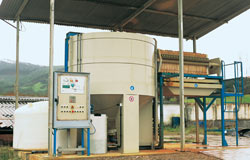
By their very nature, industrial discharges contain pollutants which have to be treated before they can be piped out.
Given the wide variety of industrial processes, there are many different pollutants, each of which has to be treated specifically.
However, so-called "PHYSICAL-CHEMICAL" processes involve a series of techniques which can be used to treat many different pollutants simply and at a reasonable cost.
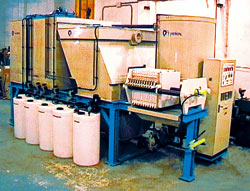
The various processes used in PHYSICAL-CHEMICAL plants are:
- Oxidation
- Correction of pH
- Precipitation
- Reduction
- Coagulation
- Filtering
- Neutralisation
- Flocculation
- Treatment of sludge
Each discharge needs to be treated with some or all of these processes, depending on the pollutants it contains.
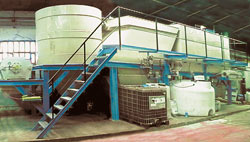
PHYSICAL-CHEMICAL plants are most often used in situations where it is necessary to eliminate solids and/or perform chemical treatments such as oxidation, reduction and precipitation. This is the case in a variety of industries, including:
- Galvanising
- Chemical manufacture
- Metal processing
- Food Industry
Depending on the flow to be treated and even on the specific treatment, the PHYSICAL-CHEMICAL plant can perform the processes continuously or by loads. As a result, the different reaction modules have to be adapted to the different types of process.
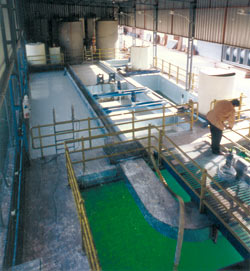
The reaction modules are made of plastic and can be arranged to make the best use of the space available. They can also be mounted on frames for easy transport and installation. And because these facilities are modular in design, they can be enlarged as required.
Large volume discharges require plants with civil engineering work and special coatings to keep the plant in optimum condition. However, the processes are the same as in smaller plants.
The best option for separating solids in continuous processes - a key part of many of the physical-chemical processes - is to use package precipitators, because they give the best performance in a much smaller space than that occupied by electrostatic precipitators.
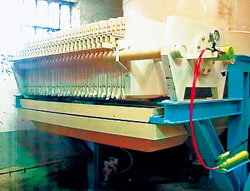
Separated sludge needs to be dehydrated before being deposited at authorised sites. This process is performed using filter elements or heat-drying techniques.
However, filter presses are the most commonly used option, given their economy and simplicity. They are operated hydraulically, either manually, automatically or semi-automatically.
Although not all physical-chemical processes are particularly complex, control and monitoring is carried out from a control panel containing the protection elements, the actuators and the automated systems, with an illuminated synoptic diagram showing the state of operation of each element and the various steps in the process.
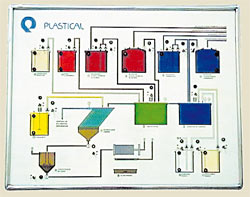
Given the nature of the treatment operations, certain chemicals need to be added under controlled conditions. This operation is performed from an easily-accessible tank area, using sets of precise dosing pumps with high chemical resistance to protect them against the products being handled.
Design of the process flows and process geometry takes into account all the options of gravity transfer, especially in continuous treatments, to simplify as far as possible the pump sets and minimise the problems that these inevitably cause.
These pumping elements are chosen according to the physical characteristics of the substances to be pumped and their position in the plant. Pneumatic and centrifuge pumps are common in this type of facility.
